|
|
|
Sort Order |
|
|
|
Items / Page
|
|
|
|
|
|
|
| Srl | Item |
| 1 |
ID:
151836
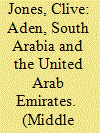

|
|
|
|
|
| Summary/Abstract |
Five decades after withdrawing its troops from Aden for the last time, the decision by the Government of Harold Wilson to abandon the Federation of South Arabia (FSA) and with it, the various tribal potentates that had aligned themselves with this project in state creation continues to generate vociferous debate. For some, any attempt to configure a modern state from a largely tribal field was doomed to fail as internecine conflict; regional rivalries punctured the illusion of a unified Federal identity, let alone a coherent state. For others, it was a lack of British political resolve as well as investment of the necessary treasure that forced the issue and saw London abandon erstwhile allies to an often bloody fate with the emergence of a Marxist-led regime in what became South Yemen after 1967. Yet just three years later, Britain oversaw the creation of the United Arab Emirates (UAE) from a collection of tribal entities, a state creation project that continues to endure. In a series of articles written by leading historians of the region as well as former diplomats, this issue of Middle Eastern Studies sets out to compare and contrast the circumstances and context surrounding the failure of the FSA with the establishment of the UAE, the legacy of which continues to shape the politics and security of the Gulf region in the twenty first century.
|
|
|
|
|
|
|
|
|
|
|
|
|
|
|
|
| 2 |
ID:
185814
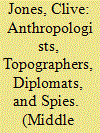

|
|
|
|
|
| Summary/Abstract |
Recent conflicts in Iraq and Afghanistan have reawakened interest as well as controversies over how Western militaries tried to engage, with varying degrees of success, with the ‘Human Terrain’. These debates are far from new. This article explores the role played by a handful of Royal Air Force Intelligence Officers across the Aden Protectorates in the 1950s. Undoubtedly, they enjoyed notable success, not least in countering the immediate territorial avarice of Yemen and Saudi Arabia. But they remained agents of an empire in retreat, their effectiveness in harnessing a granular knowledge of the tribal landscape to the delivery of aerial violence being buffeted by an environment that they could not shape and over which, despite their best endeavours, Aden could exercise little control.
|
|
|
|
|
|
|
|
|
|
|
|
|
|
|
|
| 3 |
ID:
064971
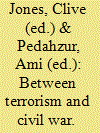

|
|
|
|
|
| Publication |
London, Routledge, 2005.
|
| Description |
vi, 141p.hbk
|
| Standard Number |
0415348242
|
|
|
|
|
|
|
|
|
|
|
|
Copies: C:1/I:0,R:0,Q:0
Circulation
| Accession# | Call# | Current Location | Status | Policy | Location |
| 049915 | 956.953044/JON 049915 | Main | On Shelf | General | |
|
|
|
|
| 4 |
ID:
181023
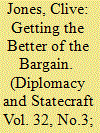

|
|
|
|
|
| Summary/Abstract |
This analysis explores the nature of Anglo-Israeli intelligence relations between 1967 and 1974, focusing in particular on how the legacy of the British mandate in Palestine, the influence of senior British diplomats, as well as wider commercial interests shaped attempts by intelligence officials on both sides to move this relationship beyond the purely functional. Whilst Israel looked to barter access to recently captured Soviet equipment for greater collaboration with the British in weapons development and arms sales, London demurred. Despite the urging of some in Whitehall, the Foreign and Commonwealth Office limited any collaboration to functional exchanges and kept them firmly in the shadows. The aftermath of the October 1973 war revealed the price paid by Britain. With Israel now dependent on Washington for the bulk of its military equipment, London’s ability to exercise any influence over Tel Aviv in reaching an accommodation with its Arab neighbours diminished greatly.
|
|
|
|
|
|
|
|
|
|
|
|
|
|
|
|
| 5 |
ID:
114163


|
|
|
|
|
| Publication |
2012.
|
| Summary/Abstract |
This article explores intelligence collaboration between British Intelligence and the Jewish Agency during the Second World War. Most accounts of this period highlight the functional nature of this collaboration, accounts that inevitably have come to be viewed through the prism of the Holocaust, and with it the prevailing sense that Britain offered 'too little too late to help' in using its clandestine assets to help rescue the remnants of European Jewry. By focusing however on collaboration primarily between the British Secret Intelligence Service (MI6) and the Jewish Agency, this article argues that intelligence liaison and collaboration at an operational level was closer and less conditioned by adherence to stated British government policy than hitherto suggested.
|
|
|
|
|
|
|
|
|
|
|
|
|
|
|
|
| 6 |
ID:
047174
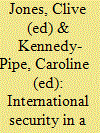

|
|
|
|
|
| Publication |
London, Frank Cass, 2000.
|
| Description |
xiii, 213p.
|
| Standard Number |
0714650617
|
|
|
|
|
|
|
|
|
|
|
|
Copies: C:1/I:0,R:0,Q:0
Circulation
| Accession# | Call# | Current Location | Status | Policy | Location |
| 044961 | 327.17/JON 044961 | Main | On Shelf | General | |
|
|
|
|
| 7 |
ID:
046505
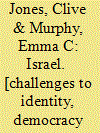

|
|
|
|
|
| Publication |
London, Routledge, 2002.
|
| Description |
xxv, 146p.
|
| Series |
Contemporary Middle East
|
| Standard Number |
041527088X
|
|
|
|
|
|
|
|
|
|
|
|
Copies: C:1/I:0,R:0,Q:0
Circulation
| Accession# | Call# | Current Location | Status | Policy | Location |
| 045365 | 320.95694/JON 045365 | Main | On Shelf | General | |
|
|
|
|
| 8 |
ID:
094623
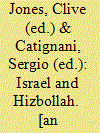

|
|
|
|
|
| Publication |
London, Routledge, 2010.
|
| Description |
ix, 202p.
|
| Contents |
Includes bibliographical reference.
|
| Standard Number |
9780415449106
|
|
|
|
|
|
|
|
|
|
|
|
Copies: C:1/I:0,R:0,Q:0
Circulation
| Accession# | Call# | Current Location | Status | Policy | Location |
| 054831 | 956.05/JON 054831 | Main | On Shelf | General | |
|
|
|
|
| 9 |
ID:
156087
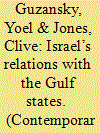

|
|
|
|
|
| Summary/Abstract |
By drawing on the literature about security regimes, this article posits the idea that a particular type of regime, which can be termed a “tacit security regime” (TSR), has begun to emerge between Israel, on the one hand, and several Gulf Arab states, on the other. It is a regime which, unlike liberal institutional variants that attempt to privilege the promotion of collective norms, remains configured around perceptions of threats to be countered and strategic interests to be realized. By examining the development, scope, and scale of this nascent TSR, this article explores the extent to which Israel, mindful of Washington, DC’s regional retrenchment, sees the emergence of such a regime as redefining the political and strategic contours of Israel’s relations with much of the Middle East.
|
|
|
|
|
|
|
|
|
|
|
|
|
|
|
|
| 10 |
ID:
158007
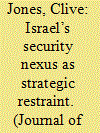

|
|
|
|
|
| Summary/Abstract |
This article examines the debates in Israel between 2009 and 2013 over Iran’s nuclear programme as a reflection of a particular type of civil–military or civil–security relationship. It analyses how key actors within that relationship – particularly those with an intelligence background – engaged with media outlets in Israel and further afield to influence domestic and international opinion over how best to contain Iran’s nuclear ambitions. In so doing, it seeks to address one fundamental question: are governments in Jerusalem any longer the final arbiters over deciding what is in the national security interests of the State of Israel?
|
|
|
|
|
|
|
|
|
|
|
|
|
|
|
|
| 11 |
ID:
073872
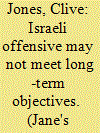

|
|
|
| 12 |
ID:
132275
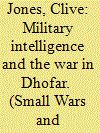

|
|
|
|
|
| Publication |
2014.
|
| Summary/Abstract |
This article examines the role military intelligence played in the Dhofar campaign between 1970 and 1976. Drawing on an array of sources, it examines not only the crucial role played by military intelligence in prosecuting a successful operational campaign against a Marxist inspired insurgency, but equally, the importance that intelligence played in consolidating the Al Bu Said dynasty when across Oman and Dhofar itself, the material benefits to be had from the discovery and production of oil had yet to be realised.
|
|
|
|
|
|
|
|
|
|
|
|
|
|
|
|
| 13 |
ID:
110343
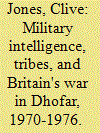

|
|
|
|
|
| Publication |
2011.
|
| Summary/Abstract |
This article examines the hitherto overlooked role of military intelligence in the Dhofar campaign of 1970-1976. Drawing on an array of new sources, it not only details the functional role of military intelligence in the campaign, but also makes a distinction between "attitudinal" and "behavioral" support in understanding the "human terrain," and thereby how military intelligence helped secure acceptance of the regime of Sultan Qaboos bin Sa'id among the tribes of Dhofar.
|
|
|
|
|
|
|
|
|
|
|
|
|
|
|
|
| 14 |
ID:
119452
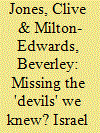

|
|
|
|
|
| Publication |
2013.
|
| Summary/Abstract |
While the immediate outcome of the Iraq War of 2003 was certainly to Israel's strategic advantage, the more immediate and indeed visceral challenge of the ongoing Al-Aqsa intifada has dominated the security horizons of most Israelis. The legacy of this conflict, with its strong Islamist overtones, has clearly had a bearing on how the Arab Awakening has come to be perceived by Israel.
Taking this experience as its starting point, this article examines the response by Tel Aviv to the Arab Awakening at an elite level and how, for the most part, Israeli perceptions of its Islamist essence, an essence that rejects popular accountability, continues to be viewed through a predominantly Realist prism. Such perceptions look set to endure, shaping Israel's immediate attitudes towards the Palestinians and the wider Arab world.
The authors argue that while Israeli concerns over the trajectory of the Arab Awakening do carry empirical weight, such concerns can be equally understood as part of a wider critique with regard to Israel's own emerging democratic deficit. This was seen most recently in a raft of legislative bills put before the Knesset between 2009 and 2012 designed to curb civil liberties in Israel; alongside its continued occupation of Palestinian lands and wider demographic shifts, such moves increasingly tarnish Israel's proud claim to be both Jewish and democratic.
|
|
|
|
|
|
|
|
|
|
|
|
|
|
|
|
| 15 |
ID:
177210
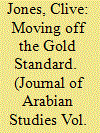

|
|
|
|
|
| Summary/Abstract |
This article analyses the rationale behind the pursuit of nuclear energy by the United Arab Emirates (UAE) and Saudi Arabia, a rationale that is best understood by a particular construct of “stateness”. While the drive towards nuclear energy is justified by a growing demographic, it is also about the projection of prestige which cuts to the very core of regime legitimacy. This in turn feeds into the growing ideational competition between and among the Gulf states and Iran, with nuclear energy increasingly being “securitised” in pursuit of this “stateless”. However, the development of a nuclear programme by Saudi Arabia in particular has come to test the normative frameworks that have hitherto regulated the transfer of nuclear technologies. With regionalism in retreat, and concern over the longer-term commitment of the United States to underpin Gulf security, the development of nuclear energy in the Gulf is leading to a truly “atomised” security complex, the dynamic of which can likely only be controlled on a bespoke basis.
|
|
|
|
|
|
|
|
|
|
|
|
|
|
|
|
| 16 |
ID:
055844
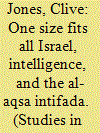

|
|
|
| 17 |
ID:
109145
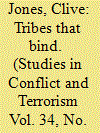

|
|
|
|
|
| Publication |
2011.
|
| Summary/Abstract |
Beset by multiple security challenges, not least the emergence of a powerful Al Qaeda franchise, Yemen appears the antithesis of the "Weberian" state model. But while these challenges are acute, they should be seen as part of a wider "political field," dominated by powerful tribes and conditioned by patrimonial networks that have long framed the modes of political exchange between the center and periphery. This remains crucial to understanding the wider eddies of tribal politics in Yemen, and in turn, the limits of a purely military response by Washington as it seeks to confront Al Qaeda in the Arabian Peninsula.
|
|
|
|
|
|
|
|
|
|
|
|
|
|
|
|
| 18 |
ID:
094112
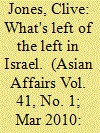

|
|
|
|
|
|
|
|